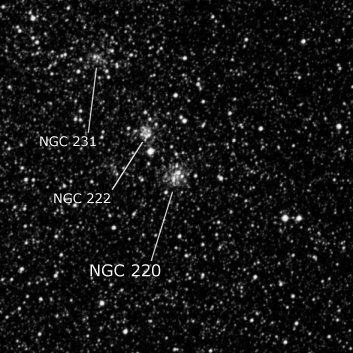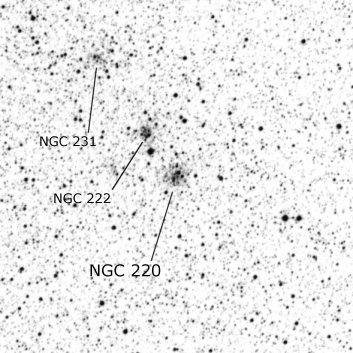NGC/IC Project Restoration Effort
(This is a very very beta version)
NGC220


Basic Information
Location and Magnitude
Right Ascension: 0:40:30.0
Declination: -73:24:15
Constellation: TUC
Visual Magnitude: 12.4
Historic Information
Discoverer: Dunlop
Year of discovery: 1826
Discovery aperture: 9.0
Observational
Summary description: F, iR, vgbM, 1st of several
Sub-type: OCL
Corwin's Notes
=====
NGC 220. JH has this in three sweeps with accordant positions. That position
is also close to the cluster we usually put this number on, so the identity is
not in question. He may also have picked up the cluster in a fourth sweep as
well; see NGC 222 for that speculation.
What interests me is the relationship of this cluster to two others in the
area which have traditionally carried the numbers NGC 222 and NGC 231, both of
which see. JH refers to these in his description in Sweep 625 on 20+-
September 1835 (see my comment at the end of this note about the uncertain
date): "The first of an irregular string of nebulae and stars which descends
at an angle of about 45 degrees from the centre to the edge of the field (i.e.
in a northeastern direction)."
The string of stars is certainly there (see my notes about NGC 222 and NGC
231), though there is no nebulosity involved, at least in the DSSR2 image of
the area -- JH was probably seeing the unresolved background light of the SMC.
Archinal and Hynes also have a discussion of this string of clusters, noting
that it is probably Dunlop's number 2 in his 1826 list.
Finally, I see that in his table of Sweeps, JH has "no such sweep" noted in
place of a date for Sweep 625. Sweep 624 was made on 19 September 1835, and
Sweep 626 on 21 September. The date I've adopted is an interpolation, of
course, but it may have been on either of the adjoining dates. Another
possibility is that the Sweep is indeed non-existent, and those objects marked
with its number may be from other sweeps.
-----
Finally, in May 2016, I checked JH's sweeps in the Herschel Archive and find
his comment "Sweep 625 No[.] omitted by mistake -- no such Sweep exists." On
the right-hand page, he also writes, "625 = 626". He notes the date as 21
September 1835. So much for the mysterious "no such sweep"!
Steve's Notes
=====
NGC 220
18" (7/10/05 - Magellan Observatory, Australia): at 228x, this SMC cluster appeared moderately bright, fairly small, round, ~50" diameter, brighter nucleus. No resolution except for a single faint star near the center. A mag 11 star lies 1' NE and just south of NGC 222. This is the first of three in a chain with NGC 222 1.5' NE and NGC 231 4.0' NE with NGC 176 24' NW. Located at the west edge of a large SMC star cloud (Hodge Association 3).



